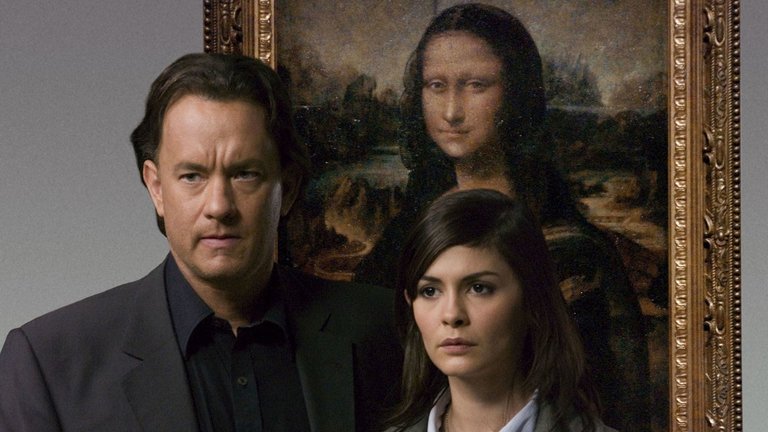Retro Film Review: The Da Vinci Code (2006)

The author of this review used to live in a country with a single, official, and unquestionable history. Then such history came to an end in tumultuous and bloody circumstances, only to be replaced with another single, official, and unquestionable history. That process, in which villains became heroes, evil became good, and triumphs became tragedies, showed that history, despite being based on unchangeable and objective facts, could be much more fluid than most people tend to believe. It also provided an explanation for the recent popularity of secret histories that tend to neatly reconcile ancient complexities with modern sentiments and the need for simplicity. Of those secret histories, probably the most successful is the one presented by Dan Brown in his best-selling novel The Da Vinci Code. Its immense literary success, spiced up by religious controversies, made its 2006 film adaptation, directed by Ron Howard, inevitable.
The protagonist of the film is Harry Langdon (played by Tom Hanks), an American symbologist who is invited by the French police to solve the bizarre murder of a renowned curator in the Louvre. The murdered man has left messages that might point towards the murderer’s identity, and the investigation is joined by Sophie Neveu (played by Audrey Tautou), a French police cryptologist and the victim’s granddaughter. Langdon and Neveu slowly reveal clues that point to a centuries-old conspiracy to suppress “inconvenient” truths about the early Christian Church and Jesus Christ. The pair is forced to investigate while fleeing both the authorities and the mysterious albino assassin Silas (played by Paul Bettany), who is connected with Opus Dei, a semi-secret organisation within the Catholic Church.
Many viewers would form their general impressions of this film based on whether they had read the novel prior to watching the film or not. For most of those who did, Akiva Goldsman, otherwise not particularly inspired as a screenwriter, does a solid job with a surprisingly faithful adaptation. This is probably due to Brown’s source material not being something exceptional. The novel is nothing more than a rehash of secret histories like The Holy Blood and the Holy Grail, neatly packed with some New Age ideas and a rather generic conspiracy thriller plot. Goldsman kept most of the novel’s flaws, but he, thankfully, didn’t succumb to the usual Hollywood standards of sacrificing exposition in order to provide the audience with more brainless action. The exposition is actually the best and most valuable part of the film, providing viewers with more food for thought than they are accustomed to expect from a Hollywood blockbuster.
The exposition also swallowed time for character development, and the cast, which was supposed to be “stellar,” was wasted. Tom Hanks’ character could have been played by a much less talented actor, and Hanks had no chemistry with the tragically miscast Audrey Tautou. On the other hand, Jean Reno, Paul Bettany, and Alfred Molina were solid in the roles of villains and pseudo-villains, while Ian McKellen provided good comic relief.
The most important factor in the film’s success is, however, the direction of Ron Howard. He succeeded in making the otherwise dull and non-cinematic exposition look entertaining and illuminating for the audience. The ancient past and characters, as well as “revolutionary” ideas, come alive through short but spectacular reconstructions while being discussed by present-day characters. Howard is also aided by a very inspired musical score by Hans Zimmer. Howard’s skill, however, can’t prevent The Da Vinci Code from seeming a little bit overlong, especially during the finale.
Despite such flaws, controversies, and critics being unusually hostile towards it, The Da Vinci Code proved to be a big hit and thus served its primary commercial purpose. However, it also served another purpose – it engaged the intellect among some of the audience, even by providing material for some serious debunking. Even the most important purpose – sowing the seeds of healthy doubt towards official truths, whether those about the past or present, was also achieved.
RATING: 6/10 (++)
(Note: The text in its original form was posted here on June 28th 2009)
Blog in Croatian https://draxblog.com
Blog in English https://draxreview.wordpress.com/
Leofinance blog https://inleo.io/@drax.leo
Hiveonboard: https://hiveonboard.com?ref=drax
Rising Star game: https://www.risingstargame.com?referrer=drax
1Inch: https://1inch.exchange/#/r/0x83823d8CCB74F828148258BB4457642124b1328e
BTC donations: 1EWxiMiP6iiG9rger3NuUSd6HByaxQWafG
ETH donations: 0xB305F144323b99e6f8b1d66f5D7DE78B498C32A7
Posted Using InLeo Alpha
Posted Using InLeo Alpha
I remember watching this movie when I was a teenager, but even now, I still don't understand what the conclusion of this movie is.
es una buena película, de verdad interesante!
it's a good movie, really interesting!
I got hooked into the movie by stumbling upon the scene where Leigh explains his ideas and slightly debates with Robert
I did like both Sophie and Audrey Tautou